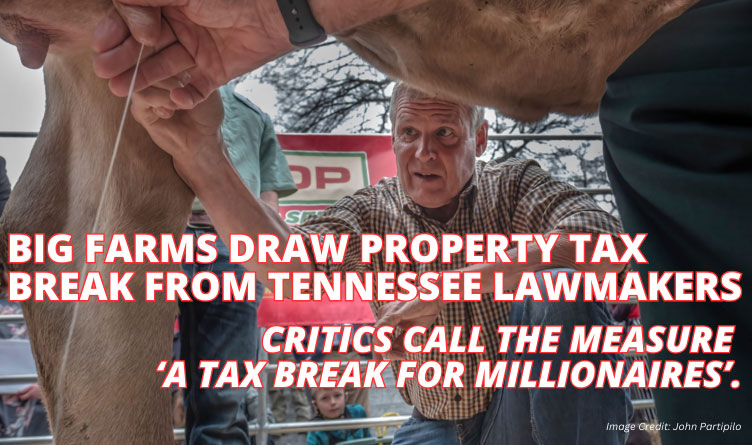Critics call the measure ‘a tax break for millionaires’.
Image: Gov. Bill Lee tries to milk a cow during Agricultural Day on the Hill Image Credit: John Partipilo
By Sam Stockard [Tennessee Lookout – CC BY-NC-ND 4.0] –
The 2024 legislative session turned out to be a banner year for Tennessee’s largest corporations and biggest farmers — at the expense of state and local government bottom lines.
Not only did Gov. Bill Lee and the 113th General Assembly give businesses a $1.9 billion franchise tax break, they’re allowing large farms to benefit from a projected $2 million measure that doubles the amount of land eligible for the state’s greenbelt program.
Under the bill headed to the governor’s desk for his signature, a maximum of 3,000 acres for one landowner can be classified as agricultural, forest or open land space, up from 1,500 acres, to qualify for the lower greenbelt rate, about an 80-90% reduction in property taxes.

While some critics call the measure “a tax break for millionaires,” lawmakers who supported the Farm Bureau initiative said it will save farms and increase investments in Tennessee’s rural areas.
Lee’s family owns a 1,000-acre cattle farm called Triple L Ranch in rural Williamson County, and he has made it clear he wants to bolster the agriculture industry.
The measure is projected to cost local governments $2 million in property tax revenue, piling on to a $1.55 billion franchise tax cut and $400 million yearly rebate in the property portion of taxes for the state’s biggest businesses.
Republican state Rep. Rick Eldridge of Morristown defended the bill in House committees meetings, saying the maximum amount of property allowed for greenbelt purposes hadn’t been increased in 40 years.
“A lot of the farms, larger producers, have had to grow their farms in order to remain efficient,” said Eldridge, who acknowledged he has property on the greenbelt program. “This is to help them and preserve the farmland.”
House passage came on a 77-17 vote. The Senate version passed 29-1 with Republican Sen. Page Walley of Savannah sponsoring it.
Initially, the state had no acreage cap on greenbelt property, but farms with more than 1,500 acres when the maximum amount was instituted 40 years ago were allowed to continue with all of their property on the greenbelt.
Opponents in the House Finance, Ways and Means Subcommittee contended that the bill would push higher taxes onto other county taxpayers as local governments try to maintain their level of services.
Will Denami, lobbyist for the state’s property assessors, told the subcommittee his group didn’t think the bill was “ready” for passage because, based on a 1984 legislative finding, the greenbelt law “must be tempered.” Otherwise, in rural counties, an “overabundance of land held by a single landowner” could hurt the tax base and disrupt county services.
Denami noted the average farm in Tennessee is 154 acres. The state has 69,983 farms, of which 1,585 have more than 1,000 acres, according to the U.S. Department of Agriculture.
“We’re talking about a very small amount of people who will get this tax break,” Denami said, adding he believes the 3,000-acre figure has no rationale. “But this could have a major impact on some of these rural areas.”
Denami mentioned Lake County in West Tennessee where one cent on the property tax rate brings in $10,329 and 1,690 acres would qualify for the tax break, costing that government a good deal of revenue.
Democratic Reps. Karen Camper of Memphis and Johnny Shaw of Bolivar also argued that such a move would wind up shifting the tax burden from farmers to other taxpayers.
Camper also raised the question of whether investors would buy farmland and lease it back to farmers. Denami responded that corporations could buy property in 10-acre pieces to reach the 3,000-acre maximum per county.
“I’m in favor of giving farmers all the breaks we can. I love farming,” Shaw said. But he contended it would create “revenue problems” for small counties such as Hardeman where a $10,000 tax revenue loss could lead to a loss of services.
Eldridge responded that counties statewide are seeing growth through home construction that will bring in enough revenue to offset losses in greenbelt assessments.

Republican Rep. Sam Whitson of Franklin countered that the bill will apply statewide, yet Williamson County, which he represents, has only two people who would qualify for the tax break, costing more than $1 million in tax revenue.
“And these two individuals are sitting on a gold mine,” Whitson said.
More time is needed to determine the measure’s impact as well as the value of forest or agricultural land farmers could use to qualify for the tax break, said Whitson, who is leaving the Legislature this year.
Other subcommittee members, though, came to Eldridge’s defense, saying Tennessee should maintain its business-friendly environment.
Republican Rep. Tim Hicks of Gray pointed out 90 of 95 counties showed growth in 2023 and said he believes the bill would “help keep farms together.”
“When a family has to put a piece of their farm in their wife’s name and their son’s name and their daughter’s name, to me, that is not only ridiculous, that is dangerous,” Hicks said.
Large family farms are often broken into ownership among family members for tax purposes.
Hicks argued that the financial impact statement prepared by the Fiscal Review Office didn’t show property tax revenue from development stemming from the sale of farmland.
“Trust me, it’s way more than $2 million,” Hicks said.


About the Author: Sam Stockard is a veteran Tennessee reporter and editor, having written for the Daily News Journal in Murfreesboro, where he served as lead editor when the paper won an award for being the state’s best Sunday newspaper two years in a row. He has led the Capitol Hill bureau for The Daily Memphian. His awards include Best Single Editorial from the Tennessee Press Association. Follow Stockard on Twitter @StockardSam



2 Responses
There are far better ways to assist real farmers. This will primarily benefit developers, not farmers.
“…camels buried under a big straw stack…”
just like small independent farmers who can’t afford “political donations”